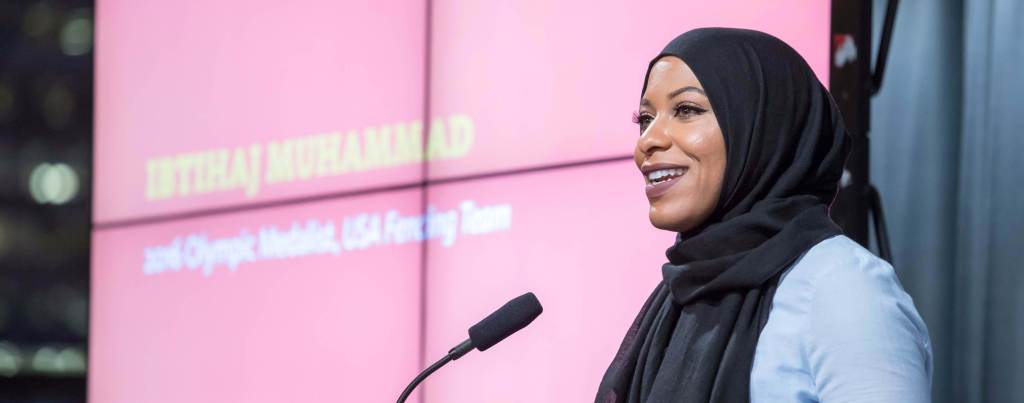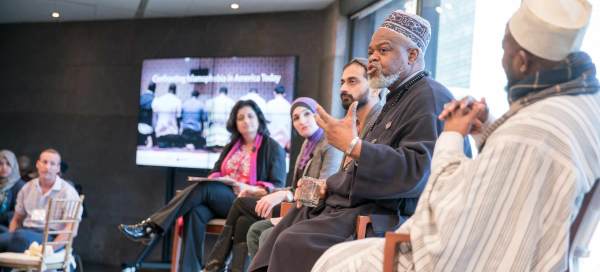
Across the world and in increasing numbers, Muslim women have been challenging stereotypes and breaking barriers with their competition in a range of sports, including figure skating, running, and weight lifting. One of those women is US Olympic medalist and entrepreneur Ibtihaj Muhammad.
As a black Muslim American woman, Muhammad cuts a distinctive figure in the predominantly white sport of fencing. At last year’s Rio Olympics, she became the first American to compete in a hijab—presaging Nike’s announcement, earlier this month, that it will launch a “Pro Hijab” for female Muslim athletes.
Muhammad is determined to use her platform to speak out in support of the things that make America great: our freedom, diversity, and common drive to excel. She spoke to Ford Foundation President Darren Walker about her experience as a woman of color, a Muslim American, and a female athlete today. Following are highlights from her remarks, and their conversation.
All people need the freedom to find their own place in the world.
People of all identities—and especially young people—need the freedom to figure out who they are, without others around them imposing strict ideas about where they belong and what they should care about. It’s the job of all of us to encourage these young people to take control of their destinies and write their own stories. Their creativity and boldness will contribute to a stronger future of more freedom and opportunity for everyone.
Accessibility Statement
- All videos produced by the Ford Foundation since 2020 include captions and downloadable transcripts. For videos where visuals require additional understanding, we offer audio-described versions.
- We are continuing to make videos produced prior to 2020 accessible.
- Videos from third-party sources (those not produced by the Ford Foundation) may not have captions, accessible transcripts, or audio descriptions.
- To improve accessibility beyond our site, we’ve created a free video accessibility WordPress plug-in.
The Internet is changing how we see and understand each other.
The Internet—especially social media—has helped dispel harmful misconceptions and stereotypes about Muslim Americans, lifting up Muslim voices and connecting them with others around the world. When Muhammad was growing up, she lacked this kind of broad, global support system, and she struggled with her identity because of it. Today, she recognizes that platforms like Instagram and Facebook play an important role in celebrating the successes of women of color, and sharing them across communities and generations.
Accessibility Statement
- All videos produced by the Ford Foundation since 2020 include captions and downloadable transcripts. For videos where visuals require additional understanding, we offer audio-described versions.
- We are continuing to make videos produced prior to 2020 accessible.
- Videos from third-party sources (those not produced by the Ford Foundation) may not have captions, accessible transcripts, or audio descriptions.
- To improve accessibility beyond our site, we’ve created a free video accessibility WordPress plug-in.
It helps to have strong role models.
Growing up, Muhammad admired Venus and Serena Williams: “unapologetically black” female athletes in a sport that was predominately white. The success and renown of Muhammad Ali also resonated with the fencer. Seeing these athletes break boundaries and make headlines helped Muhammad believe in herself and succeed as an athlete. It couldn’t be clearer that lifting up the stories of successful people from a diverse array of backgrounds—from different socioeconomic backgrounds, gender identities, races, ethnicities, and physical abilities—is key to inspiring future generations and setting them up for success.
Accessibility Statement
- All videos produced by the Ford Foundation since 2020 include captions and downloadable transcripts. For videos where visuals require additional understanding, we offer audio-described versions.
- We are continuing to make videos produced prior to 2020 accessible.
- Videos from third-party sources (those not produced by the Ford Foundation) may not have captions, accessible transcripts, or audio descriptions.
- To improve accessibility beyond our site, we’ve created a free video accessibility WordPress plug-in.
Don’t villainize. Humanize.
Too often, the burden is placed on minorities to explain and legitimize themselves and their experience. And why should that be? Muhammad argues that we should all do a better job of learning about and trying to understand other people—approaching those who are different from us first and foremost as fellow humans, with less emphasis on the ways we are different.
Accessibility Statement
- All videos produced by the Ford Foundation since 2020 include captions and downloadable transcripts. For videos where visuals require additional understanding, we offer audio-described versions.
- We are continuing to make videos produced prior to 2020 accessible.
- Videos from third-party sources (those not produced by the Ford Foundation) may not have captions, accessible transcripts, or audio descriptions.
- To improve accessibility beyond our site, we’ve created a free video accessibility WordPress plug-in.
This event was hosted in partnership with Security & Rights Collaborative, an initiative of the Proteus Fund. Watch the full event.

